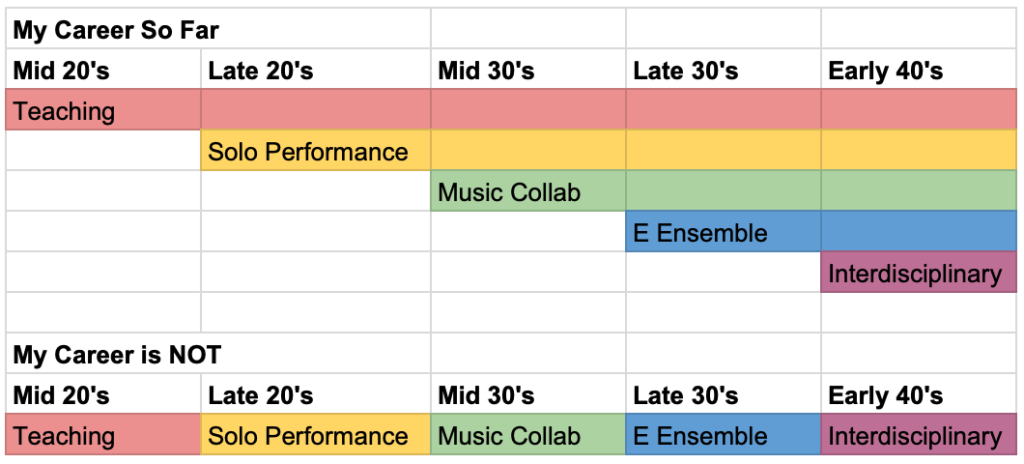A career, as in a job, as in getting paid, as in getting paid enough to live off of it, looks different for every musician. I talked about my career as an electronic musician at last year’s SPLICE Festival and ended the presentation with the chart below. It visualizes the type of work I do as a composer-performer-teacher.

With the chart above and a blurb below, I hope to share one way of living as a musician specializing in a niche genre. The first step is to define who I think I am.
I am a 44-year-old musician living in southeast Michigan. My specialty is in electroacoustic music composition and performance. I am also a music educator. Teaching music and creating music have equal value for me.
With that context, I share how I made a living doing music in chronological order.
My first and ongoing employment is university teaching. I have been a salaried full-time college professor for 16 years, and it covers most of my income—25 years if I include teaching assistantships and part-time private lessons. The teaching position gives me the financial flexibility to do creative experiments that do not yield income. I am happy to continue developing a teacher-artist career, as some of my favorite composers were also teacher-artists.
When I got my first full-time teaching position at the Community College of Philadelphia in 2008, I did not know anyone in Philadelphia. The isolated situation almost forced me to develop a solo electronic music repertoire. I was lucky to meet people who liked my solo performances and invited me to more gigs. Institutions like the fidget space, Bowerbird, electro-music, and the music program at Temple University lifted me up at the beginning of my solo performer career. To this date, most of the performance opportunities I am getting are invitations to present solo pieces.
Increased visibility as a solo performer led to opportunities to collaborate. I gained more confidence in creating technology for instrument+electronics pieces. My next teaching jobs at Oberlin Conservatory (2014-16) and Wayne State University (2016- ) also provided ample chances to meet performers who were willing to work on my music. The last piece I wrote for a traditional instrument before 2014 was in 2008. I tried to recover the six-year gap by writing and producing five instrument+electronics pieces for my third album, Modulationist (2016). This is a notable change compared to the first and second albums, which did not feature anyone but myself.
The combination of a high-end college music lab and increased confidence in working with other musicians in 2014-2016 led me to develop electronic ensemble pieces. An electronic ensemble director has been my favorite hat to wear since the premiere of the Singaporean Crosswalk. Ensemble gig opportunities are fewer than those of solo shows, as it takes more time and energy to manage an ensemble. Nevertheless, there is something special about making music together as a group of electronic musicians. I think people know that as well. Most of my guest artist talks and residencies involve electronic ensemble workshops. Projects on electronic music ensembles received awards and grants with the largest amount of monetary prizes. I won no grants with solo works.
My recent musical career focus is on multidisciplinary projects. The largest works in terms of people involved, piece length, and size of audience happened in the past four years; they were dance projects. The workflow is different and fast when producing music for dance. Experiences in my 20s and 30s prepared me to work on evening-length music for dance fast and efficiently. Collaboration with dance companies such as Artlab J takes my music to people and places I could not reach as a solo performer.
It is important to note four things in career building in music.
- A music career is cumulative. Roles are added on instead of changing from one to another. A teaching gig did not prevent me from becoming a performer or ensemble director. Different roles positively feed each other and bring more opportunities. Different roles grow together and strengthen each other.
- A music career does not have a defined path. According to my Ph.D. degree title, I am supposed to be a classical music composer writing orchestral pieces. According to my high school dream career, I am supposed to be a game music composer at Square Enix. I am not. But I am happy with the different paths education, opportunities, and communities have taken me.
- A music career may take time. It took me ten years of college-level study to comfortably call myself a musician. I have done solo performances, collaborations, and interdisciplinary works as a student, but could not see how they would develop as my identity. It took another decade of practice, failure, and refinement to see the true results of the skills I acquired at college.
- A music career needs a community. I was fortunate to be welcomed by a vibrant artistic community wherever I lived. I am grateful to be involved in institutions specialized in the field I am devoted to. Groups like SEAMUS, SPLICE, Third Practice, and Electronic Music Midwest, have been a long-term supporter and opportunity providers. It took me years to realize that.
